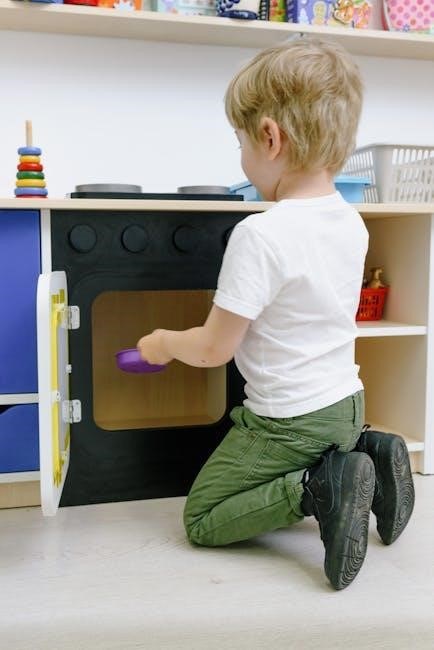Family roles in addiction involve complex dynamics, shows various roles emerge, impacting the entire family, with each member playing a part, according to available family roles in addiction pdf resources online.
Definition of Family Roles
Family roles in addiction refer to the patterns of behavior and responsibilities that family members assume in response to a loved one’s substance use disorder. These roles can be understood as a way of coping with the stress and uncertainty of living with an addict. According to family roles in addiction pdf resources, family roles are defined as the specific functions or behaviors that family members exhibit in relation to the addict. The definition of family roles is important because it helps to identify the ways in which family members interact with each other and with the addict, and how these interactions can either support or hinder recovery. By understanding the definition of family roles, families can begin to recognize the patterns of behavior that may be contributing to the addiction, and work to create a more supportive environment for recovery. This understanding is crucial for developing effective strategies for recovery.

Common Family Roles in Addiction
Family members take on various roles, such as the addict, enabler, and caregiver, according to family roles in addiction pdf resources, impacting the family dynamics greatly always online.
The Addict
The addict is the center of the family’s attention, with their substance use disorder driving the family’s dynamics, according to family roles in addiction pdf resources.
The addict’s behavior can be unpredictable and chaotic, leading to a range of emotions and reactions from family members, including anger, fear, and sadness.
Family members may feel helpless and frustrated as they try to cope with the addict’s behavior, and may even enable or cover up for the addict’s actions.
The addict’s role in the family can be complex and multifaceted, and understanding this role is crucial for developing effective treatment and support strategies, as outlined in various family roles in addiction pdf documents available online.
These documents provide valuable insights into the addict’s role and its impact on the family, and can be a useful resource for families struggling with addiction.
The addict’s recovery is also a key aspect of the family’s healing process, and requires a comprehensive and supportive approach.
The Enabler
The enabler is a family member who unintentionally supports the addict’s behavior, often by covering up or making excuses for their actions, as discussed in family roles in addiction pdf resources.
This can create a sense of dependency and reinforce the addict’s negative behavior, making it more challenging for them to seek help and recover.
The enabler’s role can be motivated by a desire to protect the addict or avoid conflict, but it ultimately perpetuates the cycle of addiction.
Family roles in addiction pdf documents emphasize the importance of recognizing and addressing enabling behaviors, as they can hinder the recovery process.
By understanding the enabler’s role, family members can begin to break free from patterns of enabling and develop healthier, more supportive relationships with the addict.
Effective communication and boundary-setting are essential for enabling family members to adopt a more supportive and less enabling role, promoting a more positive outcome for the addict.

Impact of Family Roles on Addiction
Family roles significantly influence addiction, affecting relationships and recovery, as seen in family roles in addiction pdf research and online resources available today naturally.
Effects on Family Members
Family members are deeply affected by addiction, with each person playing a unique role, as discussed in family roles in addiction pdf resources.
The emotional toll of living with an addict can be significant, leading to feelings of anxiety, depression, and helplessness.
Family members may also experience social isolation, as they become withdrawn from friends and community to cope with the addiction.
Additionally, family members may take on excessive responsibilities, such as caring for the addict or managing the household, which can lead to burnout and resentment.
The effects of addiction on family members can be long-lasting, even after the addict has sought treatment and recovery.
It is essential for family members to seek support and guidance to navigate the complex dynamics of addiction and develop healthy coping mechanisms.
Online resources, such as family roles in addiction pdf, can provide valuable information and support for family members affected by addiction.
Effects on the Addict

The addict is heavily influenced by their family dynamics, as outlined in family roles in addiction pdf.
Their addiction can be enabled or discouraged by family members, shaping their behavior and recovery prospects.
Family support or lack thereof can significantly impact the addict’s motivation to seek treatment and their overall recovery journey.
A supportive family environment can foster a sense of responsibility and accountability, encouraging the addict to address their addiction.
In contrast, an enabling or dismissive family environment can exacerbate the addiction, making it more challenging for the addict to seek help.
Understanding the complex interplay between family roles and addiction is crucial for developing effective treatment strategies, as discussed in family roles in addiction pdf resources.
By recognizing the effects of family dynamics on the addict, families and healthcare professionals can work together to create a supportive environment that promotes recovery and healing.

Changing Family Roles to Support Recovery
Family members can adapt roles to support recovery, as outlined in
research
and family roles in addiction pdf resources, promoting healing and growth together online always.
Seeking Professional Help
Seeking professional help is a crucial step in changing family roles to support recovery, as outlined in family roles in addiction pdf resources.
Professional counselors and therapists can help family members understand their roles and how to adapt them to support the addict’s recovery.
They can also provide guidance on how to communicate effectively and set healthy boundaries.
Additionally, support groups such as Al-Anon and Nar-Anon can provide a sense of community and connection for family members, helping them to cope with the challenges of addiction.
By seeking professional help, family members can gain the tools and resources they need to support their loved one’s recovery and promote healing and growth within the family.
This can involve individual therapy, family therapy, or a combination of both, depending on the specific needs of the family.
Online resources and hotlines can also provide valuable information and support.
Supporting the Addict’s Recovery
Supporting the addict’s recovery involves creating a supportive environment, as discussed in family roles in addiction pdf resources.
This can include encouraging the addict to attend therapy sessions and support groups, and being patient and understanding during the recovery process.
Family members can also help by setting clear boundaries and expectations, and by avoiding enabling behaviors that can hinder recovery.
It is also important to take care of oneself, as supporting a loved one in recovery can be emotionally challenging.
By being supportive and encouraging, family members can play a crucial role in helping the addict achieve and maintain sobriety.
Online resources and support groups can provide valuable guidance and support for family members, helping them to navigate the recovery process and promote healing and growth within the family.
This support can be a key factor in the addict’s successful recovery.
